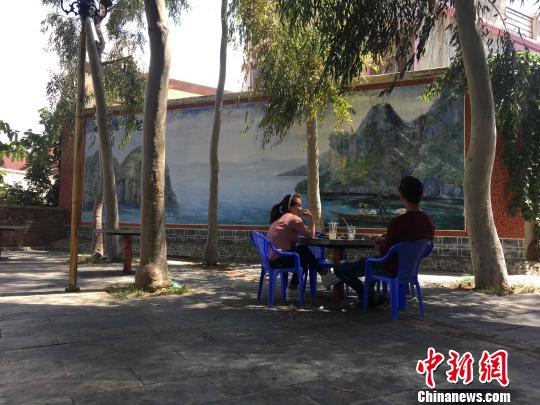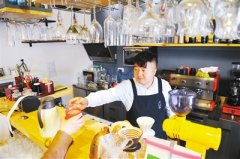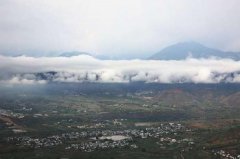The "living fossil" of Chinese coffee waits for a hundred years of "encounter"

In the second pair of coffee shops, guests taste Zhukula coffee in front of the murals in Ha long Bay, Vietnam. Photo taken by Miao Chao
Chinanews.com, Dali, April 11-(Miao Chao) more than 100 years ago, French missionaries planted coffee trees in Zhu Kula, a remote mountain village in Binchuan, Yunnan, opening the history of coffee cultivation in China. After a hundred years, Zhu Kula coffee was hidden in boudoir, until Binchuan welcomed a group of Vietnamese returned overseas Chinese.
The reporter recently visited Binchuan, the hometown of overseas Chinese in Dali, Yunnan. Under several tall birch trees on the Taihe overseas Chinese Farm, five kilometers east of the county seat, in a coffee shop run by returned overseas Chinese from Vietnam, people are tasting the fragrant Zhukula coffee. The shop, called "two pairs of Coffee", has two huge murals: one is Ha long Wan, Vietnam, and the other is the village of Zhukula, Binchuan.
In 1978, the parents of Xian Lianguo, who lived in Vietnam, returned to China and were settled in Binchuan Taihe overseas Chinese Farm. At first, my parents ran a Vietnamese breakfast restaurant and sold coffee. Later, it has been more than 30 years since I started making coffee full-time. Xian Lianguo said: "Vietnamese returned overseas Chinese are used to drinking coffee in the morning, and their parents can make authentic Vietnamese-style coffee."
It is understood that since 1956, Binchuan County has successively set up three state-run overseas Chinese farms, namely Binju, Taihe and Caifeng, to centrally house 4700 returned overseas Chinese from eight countries, including Indonesia, India, Vietnam and Myanmar. Among them, Vietnamese returned overseas Chinese are the main ones.
"at first, coffee beans were supplied by overseas Chinese Farm supply and Marketing Cooperatives. Later, we found that coffee was grown locally. " Xian Lianguo told reporters that the richness of the two pairs of coffee depends on the ancient Zhu Kula coffee tree in Binchuan.
According to textual research, in 1892, French missionary Father Tian Deneng preached in Zhukula village of Binchuan and planted coffee trees in the village, which became the earliest coffee planted in China. Up to now, Zhu Kula has 13 mu of the oldest coffee in China, and there are still more than 20 coffee trees that are more than 90 years old, which has become a "living fossil of Chinese coffee."
Although coffee has been grown for more than a hundred years, Zhu Kula coffee was hidden in boudoir before Vietnamese returned overseas Chinese came to Binchuan. Local Li Li told reporters, "although it is the earliest place in China to grow coffee, the people of Binchuan are influenced by returned overseas Chinese on overseas Chinese farms and have only begun to like coffee in recent years."
Today, the reporter in Binchuan County, cafes can be seen everywhere, appears to be "foreign style". Traveler Luo Zhonghua said that Binchuan is the county town where he has seen the most cafes.
By the beginning of 2016, the planting area of coffee in Yunnan had reached 1.77 million mu, with a total output of 139000 tons, accounting for more than 99 percent of China's output. And "Zhu Kula" has also become one of many coffee brands in Yunnan, which is sold overseas. (end)
Important Notice :
前街咖啡 FrontStreet Coffee has moved to new addredd:
FrontStreet Coffee Address: 315,Donghua East Road,GuangZhou
Tel:020 38364473
- Prev

A cup of coffee has a different entrepreneurial flavor.
Entrepreneur Jian Spring and his Green Donkey Cafe reporter Zhai Xiaoxue photographed in Xi'an Dahua 1935 art park full of cultural atmosphere and industrial history, there is a cafe called Green Donkey, which is different from the petty bourgeois atmosphere of most cafes. There are wine and stories, flowers and poetry, and an unusual entrepreneur. Yesterday, the reporter walked into the Green Donkey Cafe and listened to what happened in
- Next

Lujiangba Arabica Coffee: Large Output Lack of Famous Brands
Superior natural geographical and climatic conditions make Yunnan Arabica coffee favored by foreign merchants for its excellent quality, and its export volume accounts for more than 50% of the country's coffee exports, ranking first in the country. But 90% of exports have been lower-priced green coffee beans and lack of nationally recognized brands. At the beginning of April, the reporter of 21st Century Economic Report visited Lujiangba, Baoshan City, Yunnan Province
Related
- Can I make coffee a second time in an Italian hand-brewed mocha pot? Why can't coffee be brewed several times like tea leaves?
- Hand-brewed coffee flows with a knife and a tornado. How to brew it? What is the proportion of grinding water and water temperature divided into?
- What is the difference between Indonesian Sumatra Mantinin coffee and gold Mantinin? How to distinguish between real and fake golden Mantelin coffee?
- What does bypass mean in coffee? Why can hand-brewed coffee and water make it better?
- Unexpected! Ruixing Telunsu lattes use a smoothie machine to foam milk?!
- % Arabia's first store in Henan opens into the village?! Netizen: Thought it was P's
- Does an authentic standard mocha coffee recipe use chocolate sauce or powder? Mocha Latte/Dirty Coffee/Salty Mocha Coffee Recipe Share!
- What is the difference between Vietnam egg coffee and Norway egg coffee? Hand-brewed single product coffee filter paper filter cloth filter flat solution!
- What is the difference between sun-cured and honey-treated coffee? What are the differences in the flavor characteristics of sun-honey coffee?
- How to make Italian latte! How much milk does a standard latte use/what should the ratio of coffee to milk be?

